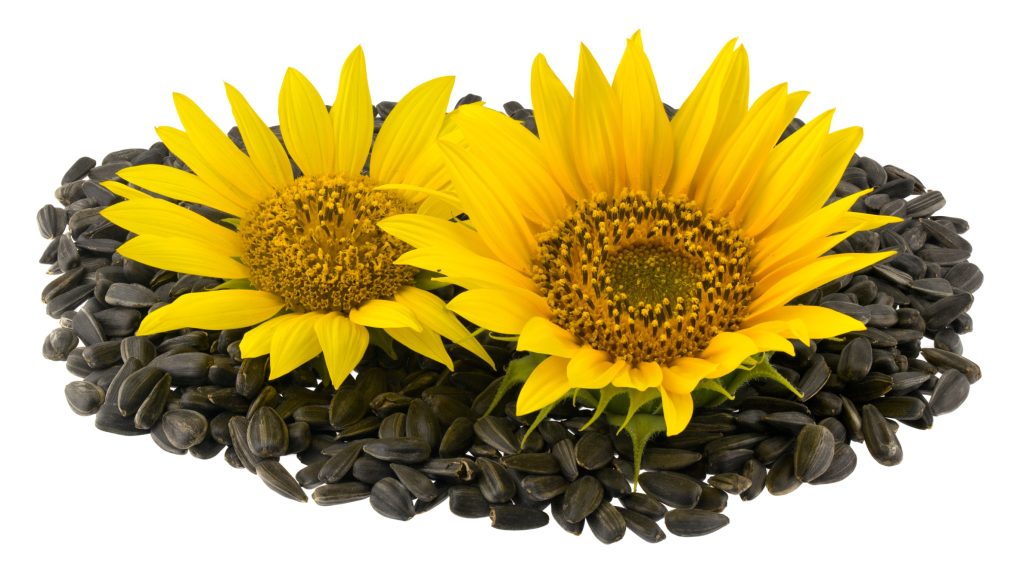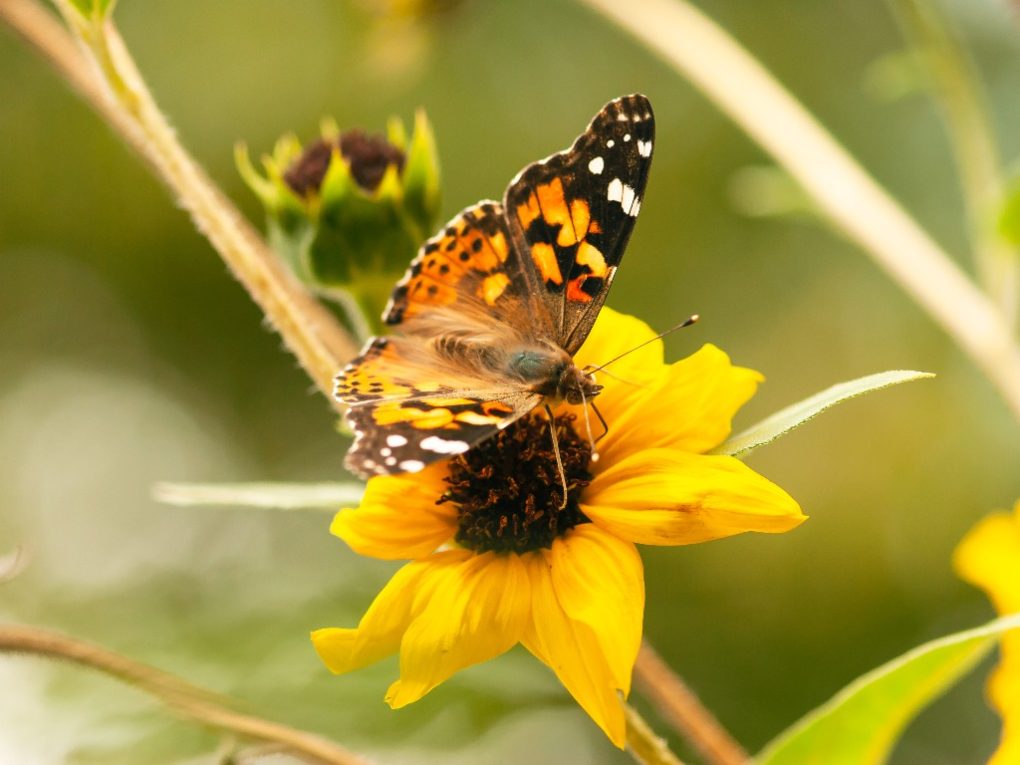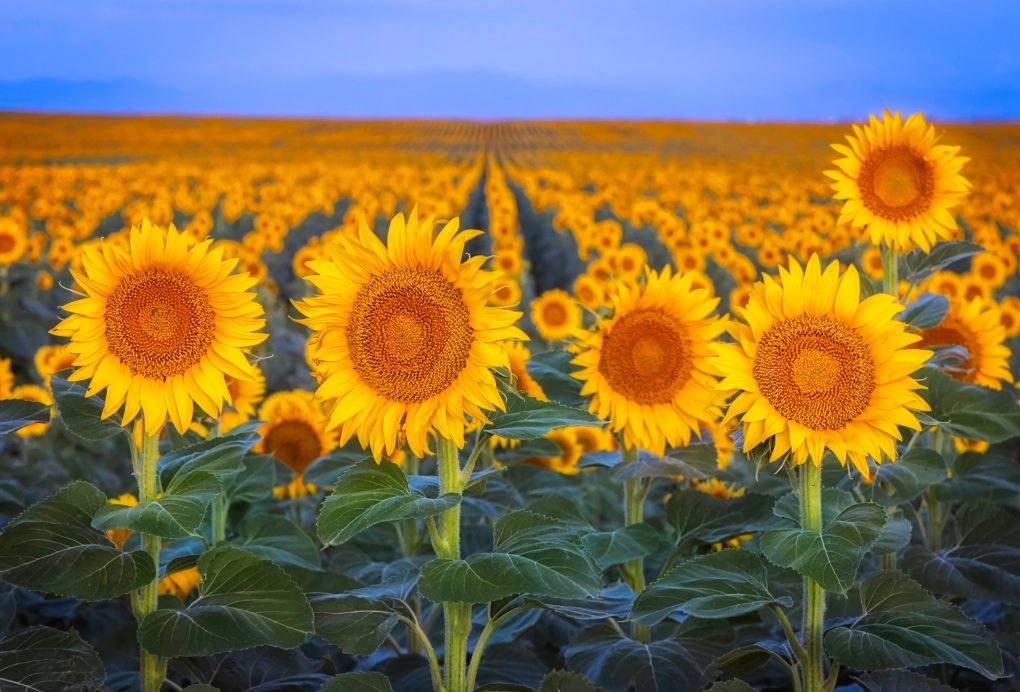Which Sunflowers Produce Seeds: What You Need to Know About Sunflower Seeds
All sunflowers produce seeds, but some varieties are grown specifically for their large, tasty seeds, commonly used for human consumption, animal feed, and oil production. Depending on their intended use, these sunflowers are known as oilseed or confectionery sunflowers. Oilseed sunflowers produce small black seeds with high oil content, typically used for oil production.
Table of Contents
Conditions Required for Sunflower Seeds to Develop

Pollination
Sunflowers are unique because they have a central disk of tiny flowers surrounded by larger, colorful petals. The central disk contains both male and female reproductive organs, while the petals are sterile and serve to attract pollinators. When a bee or other insect lands on the petals to collect nectar, it brushes against the anthers, which release pollen onto the insect’s body. As the insect moves to another flower, some pollen rubs off onto the stigma, fertilizing the ovules and leading to seed development.
Sunflowers can also be self-pollinating, meaning pollen from the same plant can fertilize the ovules. However, cross-pollination between sunflower plants can increase genetic diversity and create healthier plants.
To promote pollination in your sunflower plants, it is important to plant them in a sunny location with well-drained soil and to provide ample moisture and nutrients throughout the growing season. You can also attract pollinators to your garden by planting other attractive flowers and plants for bees and butterflies.
Temperature
Temperature is an important factor for sunflower growth and development. Sunflowers are warm-season plants and require a specific range of temperatures to thrive. Here are some key temperature requirements for sunflowers:
- Germination: Sunflower seeds need at least 10°C (50°F) soil temperatures to germinate. However, the optimal soil temperature range for germination is between 20-30°C (68-86°F). If the soil temperature is too cold, the seeds may not germinate or take longer to sprout.
- Growth: Sunflowers require warm temperatures to grow and develop properly. The optimal temperature range for sunflower growth is between 20-25°C (68-77°F). Temperatures above 32°C (90°F) can cause the plants to wilt and stress, while temperatures below 15°C (59°F) can cause slow growth and poor development.
- Flowering: Sunflowers typically flower in mid-summer, when temperatures are warm and days are long. The optimal temperature range for sunflower flowering is between 22-27°C (72-81°F). Cooler temperatures or sudden temperature drops can delay or inhibit flowering.
- Seed development: Sunflower seeds require warm temperatures to develop and mature properly. The optimal temperature range for sunflower seed development is between 20-25°C (68-77°F). Temperatures above 32°C (90°F) can cause the seeds to abort, while temperatures below 15°C (59°F) can cause slow growth and poor seed development.
Moisture
Moisture is essential for sunflower growth and development, as it helps to support proper seed germination, plant growth, and seed production. Here are some key factors to consider when it comes to moisture and sunflowers:
- Seed germination: According to Agricultural Farming, Sunflower seeds require adequate moisture to germinate properly. The soil should be moist but not waterlogged, and the seeds should be kept consistently moist until they sprout. Avoid letting the soil dry out completely, which can cause the seeds to die.
- Plant growth: As sunflowers grow, they require regular moisture to support healthy growth and development. Sunflowers should be watered deeply at least once a week or more often during hot, dry weather. The soil should be moist but not waterlogged, as waterlogged soil can lead to root rot and other issues.
- Seed production: Sunflowers require adequate moisture during seed development to support healthy seed production. The plants should be watered regularly and deeply, and the soil should be moist. However, be careful not to overwater, which can lead to mold and other issues.
- Harvest: When it comes time to harvest sunflower seeds, it is important to ensure they are dry and moisture-free. Moisture can cause the seeds to mold or spoil, so it is important to dry them thoroughly before storing them.
Nutrients
Sunflowers require several key nutrients to grow and produce healthy flowers and seeds. Here are some of the most important nutrients for sunflowers and how they support plant growth:
- Nitrogen: Nitrogen is essential for plant growth and development, as it is a key component of chlorophyll, which helps plants convert sunlight into energy. Sunflowers require a steady nitrogen supply throughout the growing season, particularly during vegetative growth.
- Phosphorus: Phosphorus is essential for root development and seed production, as it supports healthy cell growth and division. Sunflowers require higher levels of phosphorus during the flowering and seed development stages.
- Potassium: Potassium is important for overall plant health and helps to support healthy growth, drought resistance, and disease resistance. Sunflowers require higher levels of potassium during the flowering and seed development stages.
- Calcium: Calcium is important for cell wall strength and helps to support healthy stem and leaf development. Sunflowers require adequate levels of calcium throughout the growing season.
- Magnesium: Magnesium is essential for chlorophyll production and helps to support healthy photosynthesis. Sunflowers require adequate levels of magnesium throughout the growing season.
- Sulfur: Sulfur is important for protein synthesis and helps to support healthy plant growth and development. Sunflowers require adequate levels of sulfur throughout the growing season.
Time
The timing of planting and caring for sunflowers is critical for their growth and development. Here are some key considerations related to time and sunflower care:
- Planting time: Sunflowers are typically planted in the spring after the last frost, although the exact planting time will depend on your location and climate. Sunflowers generally require warm soil and air temperatures to germinate and grow, so planting should coincide with the onset of warm weather.
- Flowering time: Sunflowers typically begin to flower about 70-100 days after planting, depending on the variety. Choosing a variety suited to your climate and planting schedule is important to ensure that your sunflowers flower at the right time.
- Harvest time: Sunflowers are typically harvested in the fall after the seeds have fully matured and the flower heads have begun to dry out. Harvesting too early can result in immature seeds, while harvesting too late can cause the seeds to shatter or become moldy.
- Watering time: Sunflowers should be watered deeply at least once a week or more often during hot, dry weather. It is best to water in the early morning or evening when the temperatures are cooler and the sun is less intense. Avoid watering during the middle of the day, as this can cause the water to evaporate before the plants can absorb it.
- Fertilizing time: Sunflowers should be fertilized throughout the growing season with a balanced nitrogen, phosphorus, and potassium fertilizer. It is best to fertilize early in the season before the plants begin to flower and again during the flowering and seed development stages.
Benefits of Growing Sunflowers for Seeds

Nutritious Food Source
Sunflower seeds are a highly nutritious food source, rich in essential nutrients. Here are some of the main nutritional benefits of sunflower seeds:
- Protein: Sunflower seeds are a good source of plant-based protein, with about 6 grams of protein per ounce.
- Healthy fats: Sunflower seeds are high in healthy fats, including polyunsaturated and monounsaturated fats, which can help reduce the risk of heart disease and improve cholesterol levels.
- Fiber: Sunflower seeds are a good source of dietary fiber, which can help improve digestion and promote feelings of fullness.
- Vitamins and minerals: Sunflower seeds are a rich source of several important vitamins and minerals, including vitamin E, vitamin B1, magnesium, copper, and selenium. Vitamin E is an antioxidant that can help protect cells from damage, while magnesium is important for bone health and blood sugar regulation.
- Other compounds: Sunflower seeds also contain several other beneficial compounds, including phytosterols, which can help reduce cholesterol levels, and lignans, which may have anti-cancer properties.
Economic Value
Sunflower seeds have significant economic value, with many applications in the food industry and beyond. Here are some of the main ways that sunflower seeds are used commercially:
- Food products: Sunflower seeds are a common ingredient in many food products, including snacks, baked goods, and condiments. They can be roasted, salted, or flavored in various ways and are often used as a crunchy and nutritious addition to salads and other dishes.
- Birdseed: Sunflower seeds are a popular ingredient in birdseed blends due to their high nutrient content and appeal to many types of birds.
- Oil production: Sunflower seeds can be pressed to extract oil, which is used in a variety of food products, as well as in cosmetics, soaps, and other personal care items.
- Biofuel: Sunflower oil can also be used as a biofuel due to its high energy content and low emissions.
- Other industrial uses: Sunflower seeds are used in various industrial applications, such as animal feed, fertilizer, and even as a natural dye for textiles.
Wildlife Habitat
Sunflowers can also provide valuable habitats for wildlife. Here are some ways that sunflowers can benefit wildlife:
- Birds: Sunflowers are attractive to many species of birds, including finches, chickadees, and nuthatches, which feed on the seeds. Sunflower seeds can be left on the flower heads after blooming, providing a natural food source for birds.
- Bees and other pollinators: Sunflowers are also attractive to bees and other pollinators, which visit the flowers to collect nectar and pollen. This can help support healthy populations of pollinators in the surrounding area.
- Insects and other invertebrates: Sunflowers provide a habitat for insects and other invertebrates, including butterflies, moths, and spiders. These organisms can contribute to healthy ecosystems by providing food for other wildlife and helping to control pest populations.
- Small mammals: Sunflowers can also provide habitat for small mammals, such as mice and squirrels, which may feed on the seeds.
Aesthetic Appeal

In addition to their practical benefits, sunflowers have aesthetic appeal, making them popular for landscaping and ornamental gardens. Here are some ways that sunflowers can be used for their visual appeal:
- Landscaping: Sunflowers can create eye-catching displays in outdoor spaces, such as gardens, parks, and public areas. Large sunflowers can create a dramatic effect, while smaller groupings can add color and interest to the landscaping.
- Cut flowers: Sunflowers are popular with bright yellow petals and distinctive dark centers. Sunflowers can be used in floral arrangements, either alone or in combination with other flowers.
- Decorative objects: Sunflowers can create various decorative objects, such as wreaths, garlands, and centerpieces. These can add visual interest to homes, businesses, and other indoor spaces.
- Photography: Sunflowers are a popular subject for photography, with their bold colors and striking appearance. Sunflower fields and individual flowers can make for stunning photographic subjects.
Educational Value
Growing sunflowers can also have educational value, particularly for children and students. Here are some ways that sunflowers can be used for educational purposes:
- Science lessons: Sunflowers can be used to teach a variety of science concepts, including plant growth and development, photosynthesis, and pollination. Students can observe and record the growth of sunflowers over time and learn about the factors that contribute to healthy plant growth.
- Art projects: Sunflowers are also a popular subject for art projects, inspiring paintings, drawings, and other creative endeavors.
- History and culture: Sunflowers have a long history of cultural significance and can be used to teach lessons about plants’ cultural and historical significance. For example, sunflowers were important to Native American cultures and have been used in various ways throughout history.
- Environmental awareness: Growing sunflowers can also help promote environmental awareness and conservation. Students can learn about the importance of biodiversity and habitat conservation and how individual actions can contribute to environmental sustainability.
